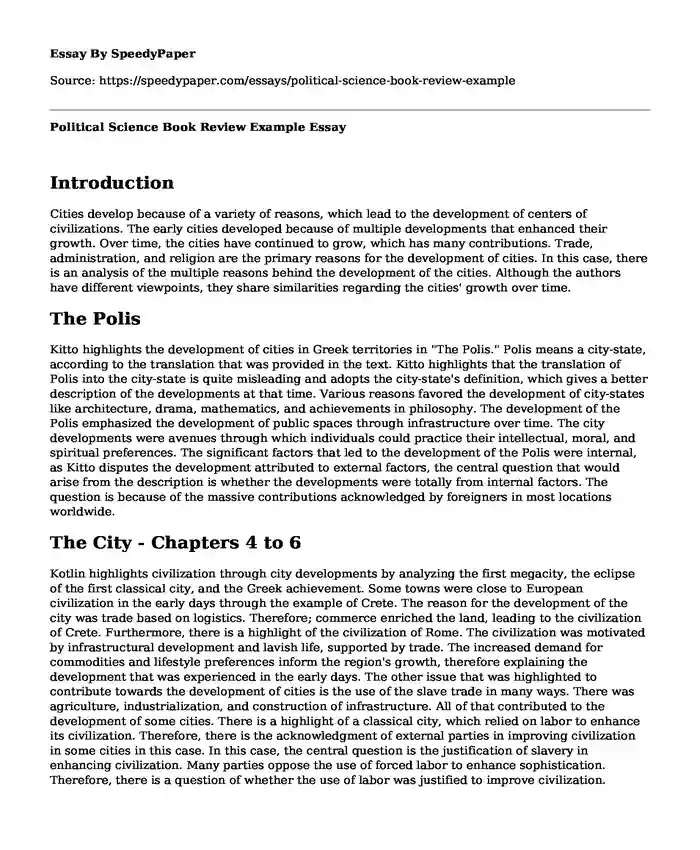
| Essay type: | Book review |
| Categories: | Development Industrial revolution |
| Pages: | 3 |
| Wordcount: | 788 words |
Introduction
Cities develop because of a variety of reasons, which lead to the development of centers of civilizations. The early cities developed because of multiple developments that enhanced their growth. Over time, the cities have continued to grow, which has many contributions. Trade, administration, and religion are the primary reasons for the development of cities. In this case, there is an analysis of the multiple reasons behind the development of the cities. Although the authors have different viewpoints, they share similarities regarding the cities' growth over time.
The Polis
Kitto highlights the development of cities in Greek territories in "The Polis." Polis means a city-state, according to the translation that was provided in the text. Kitto highlights that the translation of Polis into the city-state is quite misleading and adopts the city-state's definition, which gives a better description of the developments at that time. Various reasons favored the development of city-states like architecture, drama, mathematics, and achievements in philosophy. The development of the Polis emphasized the development of public spaces through infrastructure over time. The city developments were avenues through which individuals could practice their intellectual, moral, and spiritual preferences. The significant factors that led to the development of the Polis were internal, as Kitto disputes the development attributed to external factors, the central question that would arise from the description is whether the developments were totally from internal factors. The question is because of the massive contributions acknowledged by foreigners in most locations worldwide.
The City - Chapters 4 to 6
Kotlin highlights civilization through city developments by analyzing the first megacity, the eclipse of the first classical city, and the Greek achievement. Some towns were close to European civilization in the early days through the example of Crete. The reason for the development of the city was trade based on logistics. Therefore; commerce enriched the land, leading to the civilization of Crete. Furthermore, there is a highlight of the civilization of Rome. The civilization was motivated by infrastructural development and lavish life, supported by trade. The increased demand for commodities and lifestyle preferences inform the region's growth, therefore explaining the development that was experienced in the early days. The other issue that was highlighted to contribute towards the development of cities is the use of the slave trade in many ways. There was agriculture, industrialization, and construction of infrastructure. All of that contributed to the development of some cities. There is a highlight of a classical city, which relied on labor to enhance its civilization. Therefore, there is the acknowledgment of external parties in improving civilization in some cities in this case. In this case, the central question is the justification of slavery in enhancing civilization. Many parties oppose the use of forced labor to enhance sophistication. Therefore, there is a question of whether the use of labor was justified to improve civilization.
The City - Chapters 10 to 11
In "The City" Chapters 10 and 11, Kotkin highlights Europe's urban reinsurance, where there are various factors that enhanced the civilization that was seen in multiple territories. Religion has been highlighted as a significant factor that enhanced sophistication in Europe. The Catholic Church was a considerable force, where there was a great deal of development that was pegged to the religious activities associated with the religion. Therefore, the church is considered as the major party that enhanced civilization in society at that time. Thus, religion is seen as a robust platform that enhanced Europe's development in various ways and spearheaded the development of cities. Furthermore, there is an acknowledgment of the role of politics in supporting religion and civilization. The question that could be raised in this segment is about the part of external parties in the development of the cities.
The History of Urban Form: Before the Industrial Revolutions
Morris highlights the urban form, whereby there are significant contributions that enhance civilization. The cities' location was an essential factor that enhanced their growth, a great example being the Greek cities. The location of a town determines its ability to trade and engage in other activities that facilitate development. Furthermore, there is the highlight of the form of the Roman empire and the patterns of civilization associated with its refinement. The population of the various cities has been highlighted as a significant factor that enhanced improvement. The more people, the more amenities they need for their comfort. Therefore, civilization was based on more human activities and the population growth that was seen over time. Consequently, it is evident that the cities grew based on internal factors more than external intervention. However, with time, there was an increase in intervention from external parties that enhanced civilization. The primary question in this segment is if the city plans were meant to accommodate population growth.
Cite this page
Political Science Book Review Example. (2023, Dec 30). Retrieved from https://speedypaper.net/essays/political-science-book-review-example
Request Removal
If you are the original author of this essay and no longer wish to have it published on the SpeedyPaper website, please click below to request its removal:
- Terrorism in America Essay Example
- Essay Example: Role of Teachers and Other Adults in the Inclusive Classroom
- A Primary Condition Commonly Seen in Early Childhood Settings - Paper Sample
- Paper Example. Exploring the "Big Picture" of a Long Term Care (LTC)
- Essay Example: Experience of Parents of Children With Exceptional Needs
- Paper on Unlocking Potential: The Impact of Competitive Athletics on Personal Development and Academic Success
- A Plan on How to Raise a Child - Essay Sample
Popular categories




